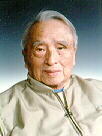

Tang Peisong (P.S. Tang) (1903-2001) was a native of Xishui, Hubei Province. Tang was a plant physiologist, and one of the esteemed co-founders of the modern Chinese Plant Physiology. He graduated from Tsinghua College in 1925. Then he earned his bachelor's degree from University of Minnesota in 1928. He obtained his Ph. D. degree of Johns Hopkins University in 1930. He was elected as an academician of Chinese Academy of Sciences in 1955. He was honorary head of Plant Research Institute of Chinese Academy of Sciences.
In 1933, he accepted an invitation from Wuhan University and returned to the then devastatingly conflicting homeland of China and ever since, he has begun his "devious trail of a roaming plant physiologist". He had long been involved in the systematic studies of the plant physiology and biochemistry and made a series of great academic achievements frequently valued at home and abroad. In his earlier work, he had successfully proved the existence of the respiratory enzyme (i.e. cytochrome oxidase) in plants and proposed that there exist various but interconnected respiratory metabolic path ways and electron transfers in the same plant. He had firstly put forward the widely accepted concept of "control of respiration (by enzyme reactions) and respiratory control (of physiological activities) in the living and intact tissues" in 1950s and experimentally proved the existence of carbonic anhydrase in plants for the first time. Based on this concept, he solved the long-existing problem of rice seedling rot in China. He and Prof. J. S. Wang (also a senior Chinese Academician) thermodynamically illustrated the movement mechanisms of the intercellular water content in 1940s and which has been finally acclaimed and referred to as a forerunning and creative "Tang-Wang theory" of the cellular water potential by authentic international experts. The idea in his book "Green Thraldom" about the multi-level utilization of the solar energy in order to respond to the long-term energy requirements by human society had been enthusiastically quoted by other researchers of the time. He and his colleagues and students had already published about 200 scientific research papers. He has received many times the National and the Academy Awards for Sciences, which is undoubtedly a highly appraising for his outstanding contributions to the Chinese and world plant physiology research progress. Tang was award Ho Leung Ho Lee Award for Science and Technology Progress in 1997.